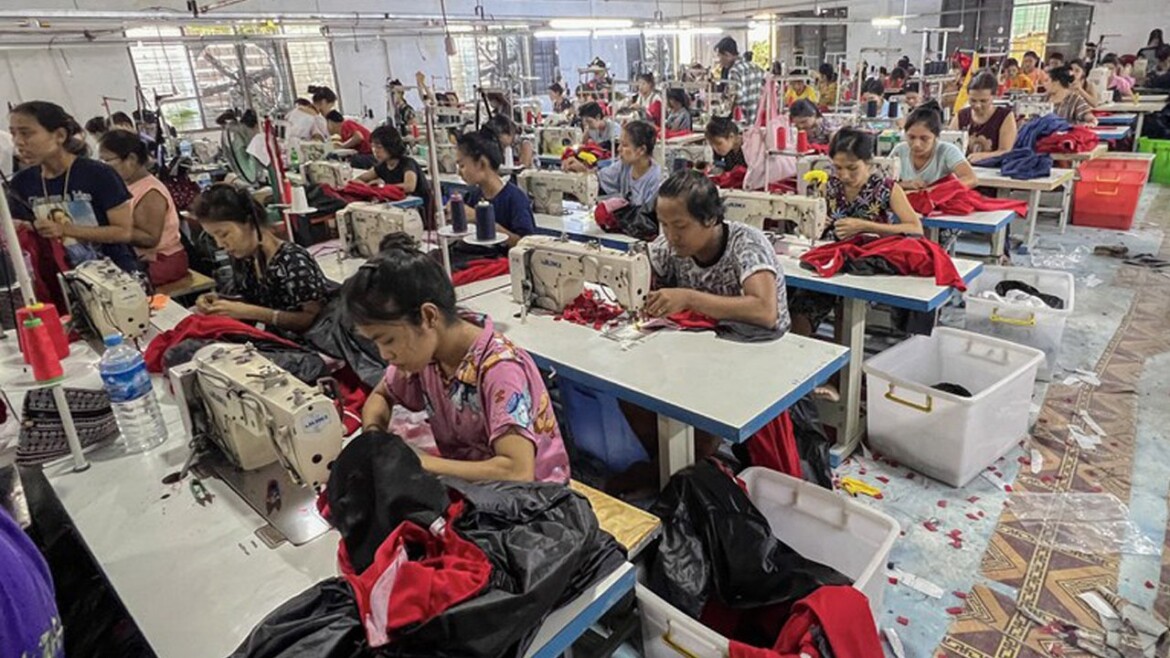To improve working conditions in the garment industry, we must support organised garment workers in advocating for better conditions for themselves!
This was the main message emphasised by IWW member Kirsten in their presentation to the UCC Global Justice Society in Cork as part of the event “Union Busting in Fast Fashion” on Wednesday 11th October. The Global Justice Society invited a local IWW member to speak about union busting generally and what forms it can take, as well as examples both more locally, in regards to the firing of workers at Saramago in Glasgow, and in the garment industry particularly in Myanmar. While union members face intimidation and various union busting tactics in all countries where fast fashion is produced, the situation is particularly dire in Myanmar where the Federation of General Workers Myanmar (FGWM) are facing repression by the military regime which seized power on February 1, 2021.
The FGWM is an association of (grassroots) unions that are organised primarily by the workers themselves, which makes it even more pressing for IWW members and the public to support them, since they represent the workers on the ground in Myanmar who are standing up to the regime despite great personal cost.
The cause of the FGWM was included as a particularly relevant example because the fast fashion industry directly profits from the worsening of conditions and wages that are keeping production costs low in Myanmar, as union members are directly targeted by the regime and are subject to violent methods of union busting, limiting their ability to advocate for their own conditions

As part of the event, attendees were provided with links to the fundraiser for the FGWM which was set up by the Free Workers’ Union (FAU), Industrial Workers of the World (IWW), and Earth Strike UK to provide funds to assist the FGWM in continuing important activities such as providing safe houses for their members in hiding, financing resistance projects, or organising workshops supporting workers to get organised at their workplaces.
IWW member Kirsten also provided links to ongoing campaigns related to workers’ rights in the
garment industry including the No Sweat campaign which promotes bands using union-produced shirts for their merchandise, the Punks Against Sweatshops solidarity music album, and the #PayYourWorkers campaign to put pressure on brands to pay garment workers unpaid wages following the firings during the Covid pandemic. These included actions attendees could take such as donating to campaigns funding worker organising, emailing brands about unpaid wages or
posting to highlight the issue on social media, so that the presentation went beyond awareness raising and included practical actions that could be taken right there during the event.
Promising developments such as the International Accord for Health and Safety in the Textile and Garment Industry (which developed out of the Bangladesh Accord following the horrific loss of life in the April 2013 Rana Plaza building collapse that killed more than 1,000 workers) were mentioned, that aim to improve conditions in garment production through measures such as inspections and through collaboration with brands and unions in the industry.
However, it was also reiterated during the event that worker organising is at the core of improving conditions and wages for garment workers, and brands are unlikely to make true meaningful change without pressure from workers since these brands are the same ones who profit from having garments made in countries with less labour protections to begin with in the first place.
Supporting unions organising in the garment industry and the campaigns which work directly with them, and taking the collective actions promoted by the unions themselves and by these campaigns, are ways out of the individualistic approach to “ethical consumerism” that prevails in much of the discussion on worker’s rights in the industry.
As members of a revolutionary union, we know that it is the workers who know their industries the best – to help advance worker’s rights in the garment industry, we must go beyond raising awareness and instead take actions and follow campaigns endorsed by the unions who organise in this industry. In doing so, we can show that solidarity is more than just a word and that its reach transcends borders.
This is our strength as workers!
IWW Ireland




